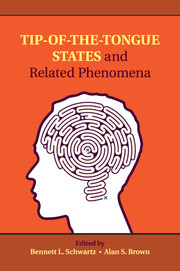
-
Select format
-
- Publisher:
- Cambridge University Press
- Publication date:
- June 2014
- June 2014
- ISBN:
- 9781139547383
- 9781107035225
- 9781316623268
- Dimensions:
- (228 x 152 mm)
- Weight & Pages:
- 0.63kg, 363 Pages
- Dimensions:
- (229 x 152 mm)
- Weight & Pages:
- 0.53kg, 366 Pages
- Subjects:
- Biological Psychology, Psychology
You may already have access via personal or institutional login- Subjects:
- Biological Psychology, Psychology
Book description
When the memory retrieval process breaks down, people wonder exactly why and how such a thing occurs. In many cases, failed retrieval is accompanied by a 'tip-of-the-tongue state', a feeling that an unretrieved item is stored in memory. Tip-of-the-tongue states stand at the crossroads of several research traditions within cognitive science. Some research focuses on the nature of the retrieval failure. Other research tries to determine what tip-of-the-tongue states can tell us about the organization of lexical memory - what aspects of a word we can recall when we are otherwise unable to do so. Still other research focuses on the nature of the experience. Each perspective is represented in this book, which presents the best theoretical and empirical work on these subjects. Much of the work is cross-disciplinary, but the topics concern strong phenomenological states of knowing that are not accompanied by recall or recognition of the desired information.
Contents
Metrics
Full text views
Full text views help Loading metrics...
Loading metrics...
* Views captured on Cambridge Core between #date#. This data will be updated every 24 hours.
Usage data cannot currently be displayed.
Accessibility standard: Unknown
Why this information is here
This section outlines the accessibility features of this content - including support for screen readers, full keyboard navigation and high-contrast display options. This may not be relevant for you.
Accessibility Information
Accessibility compliance for the PDF of this book is currently unknown and may be updated in the future.


